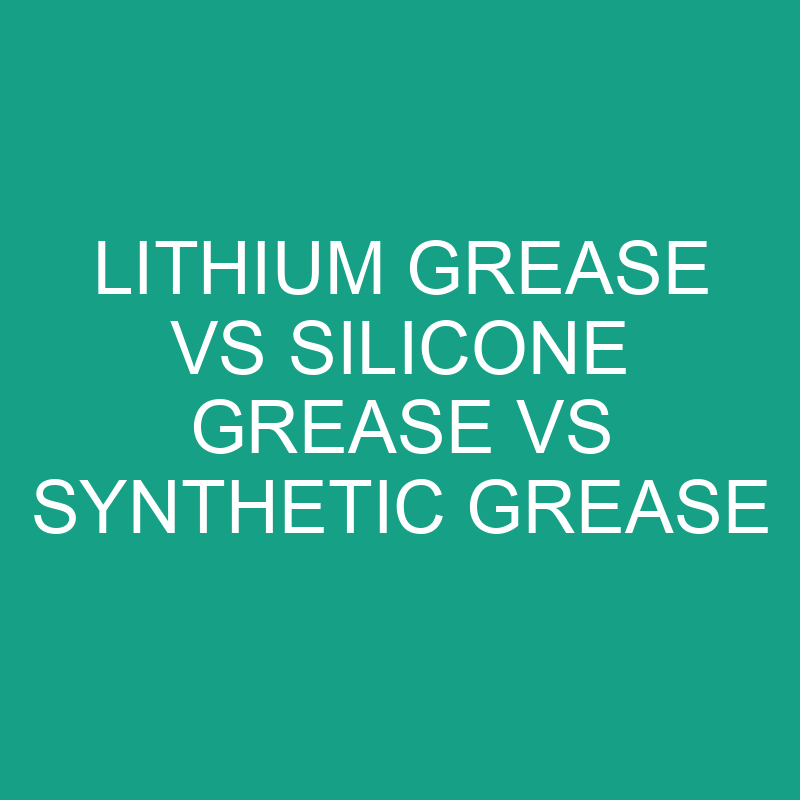Navigating the Grease World: Lithium vs. Silicone vs. Synthetic Grease
Grease is a crucial lubricant used in various industries to reduce friction, prevent wear and corrosion, and ensure the smooth operation of machinery. Among the plethora of grease options, lithium grease, silicone grease, and synthetic grease stand out for their unique properties and applications. In this extensive guide, we’ll delve into the intricate details of lithium grease, silicone grease, and synthetic grease, exploring their formulations, characteristics, applications, advantages, and considerations. By the end, you’ll be well-equipped with the knowledge needed to choose the right grease for your specific needs.
Post Contents
1. Introduction to Greases:
1.1 Importance of Lubrication:
Lubrication is a critical aspect of machinery maintenance, ensuring that moving parts operate smoothly and efficiently. Greases play a pivotal role in this process by providing a protective layer between surfaces, reducing friction, and preventing wear.
1.2 Common Types of Greases:
- Lithium Grease: A popular multi-purpose grease with excellent stability and water resistance.
- Silicone Grease: Known for its water-resistant and high-temperature properties.
- Synthetic Grease: Engineered for specific applications, often with enhanced performance characteristics.
2. Lithium Grease:
2.1 Formulation:
- Base Oil: Lithium greases use mineral oil as a base.
- Thickener: Lithium soap is the common thickening agent.
- Additives: May include anti-wear agents, rust inhibitors, and antioxidants.
2.2 Characteristics:
- Versatility: Widely used in automotive, industrial, and marine applications.
- Water Resistance: Exhibits good water resistance, suitable for applications in moist conditions.
- Temperature Range: Functions well within a broad temperature range.
2.3 Applications:
- Automotive Use: Chassis components, wheel bearings, and universal joints.
- Industrial Machinery: Bearings, gears, and general-purpose lubrication.
- Marine Applications: Resistant to water, making it suitable for marine environments.
3. Silicone Grease:
3.1 Formulation:
- Base Oil: Silicone oil serves as the base.
- Thickener: May use various thickeners, including silica.
- Additives: Can include anti-wear agents and corrosion inhibitors.
3.2 Characteristics:
- Water Resistance: Highly water-resistant and does not easily wash away.
- Temperature Stability: Performs well in high-temperature applications.
- Dielectric Properties: Electrically insulating, suitable for electrical applications.
3.3 Applications:
- Rubber Parts: Compatible with rubber, making it suitable for O-rings and seals.
- Plumbing Applications: Used on plumbing fixtures and fittings.
- Electrical Connections: Provides protection and lubrication for electrical components.
4. Synthetic Grease:
4.1 Formulation:
- Base Oil: Synthetic oils, such as polyalphaolefin (PAO) or polyalkylene glycol (PAG).
- Thickener: Various thickeners, including complex soaps or non-soap materials.
- Additives: Tailored additives for specific performance enhancements.
4.2 Characteristics:
- Wide Temperature Range: Performs well in extreme temperatures.
- Chemical Stability: Resists oxidation and degradation over time.
- Specialized Formulations: Engineered for specific applications, such as high-speed bearings.
4.3 Applications:
- High-Speed Bearings: Suitable for applications where high-speed rotation is involved.
- Extreme Temperatures: Performs well in both high-temperature and low-temperature conditions.
- Specialized Industries: Tailored formulations for specific industries like aerospace.
5. Advantages and Considerations:
5.1 Advantages of Lithium Grease:
- Versatility: Suitable for a wide range of applications.
- Cost-Effective: Generally more affordable than synthetic alternatives.
- Water Resistance: Offers good protection against water washout.
5.2 Considerations for Lithium Grease:
- Temperature Limitations: May not perform as well in extremely high or low temperatures.
- Specialized Needs: In certain demanding applications, a more specialized grease may be required.
5.3 Advantages of Silicone Grease:
- Water Resistance: Exceptional water resistance makes it ideal for wet environments.
- Dielectric Properties: Suitable for electrical applications where insulation is critical.
- Rubber Compatibility: Compatible with rubber and plastics.
5.4 Considerations for Silicone Grease:
- Limited Load-Carrying Capacity: May not be suitable for applications with heavy loads.
- Cost: Can be more expensive than traditional lithium greases.
5.5 Advantages of Synthetic Grease:
- Wide Temperature Range: Performs exceptionally well in extreme temperatures.
- Longer Lifespan: Often has a longer service life compared to conventional greases.
- Specialized Formulations: Tailored for specific applications, providing optimized performance.
5.6 Considerations for Synthetic Grease:
- Cost: Generally more expensive than lithium greases.
- Compatibility: Care must be taken to ensure compatibility with existing greases in a system.
6. Choosing the Right Grease:
6.1 Application Requirements:
- Temperature Conditions: Consider the temperature range the grease will be exposed to.
- Load-Bearing Capacity: Evaluate the load-bearing requirements of the application.
- Water Exposure: Assess the likelihood of exposure to water or moisture.
6.2 Cost Considerations:
- Budget Constraints: Consider the budget available for lubrication maintenance.
- Long-Term Cost: Factor in the potential longer service life of synthetic greases.
6.3 Compatibility:
- Existing Lubricants: Ensure compatibility with any existing lubricants in the machinery.
- Material Compatibility: Consider the compatibility with materials in the application.
7. Conclusion:
In conclusion, the choice between lithium grease, silicone grease, and synthetic grease depends on the specific requirements of your application. Lithium grease is a versatile and cost-effective option for a wide range of applications. Silicone grease, with its exceptional water resistance and electrical insulating properties, is suitable for specific environments. Synthetic grease, engineered for performance, excels in extreme temperatures and demanding applications. By understanding their formulations, characteristics, advantages, and considerations, you can make an informed decision that ensures optimal machinery performance, longevity, and reliability.
